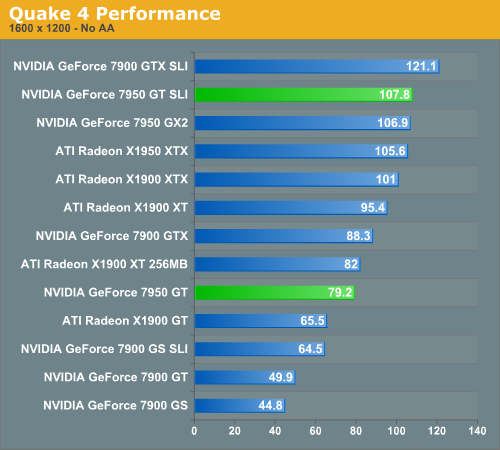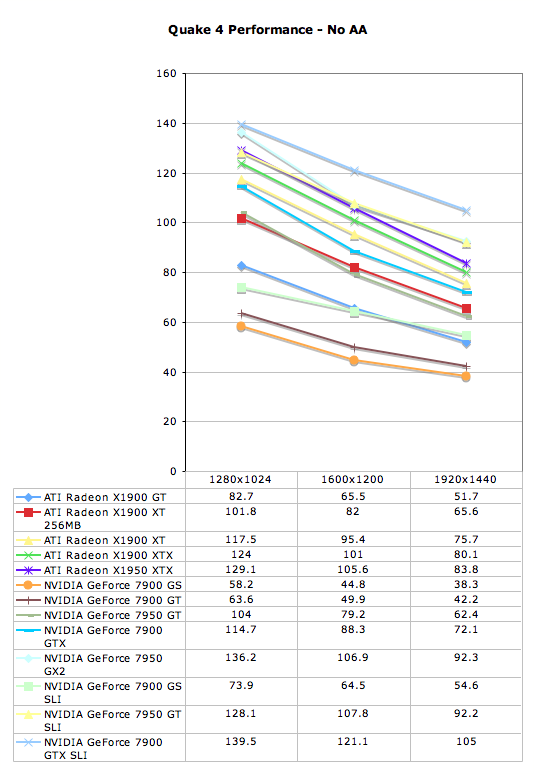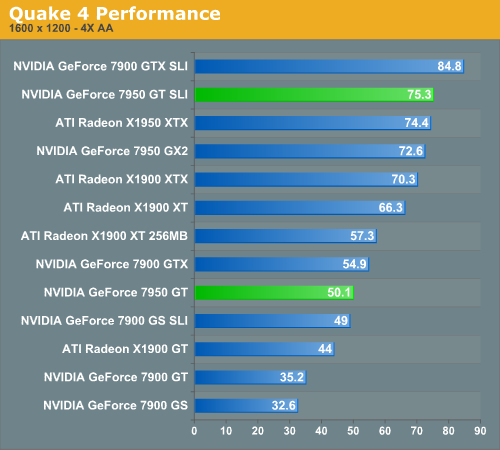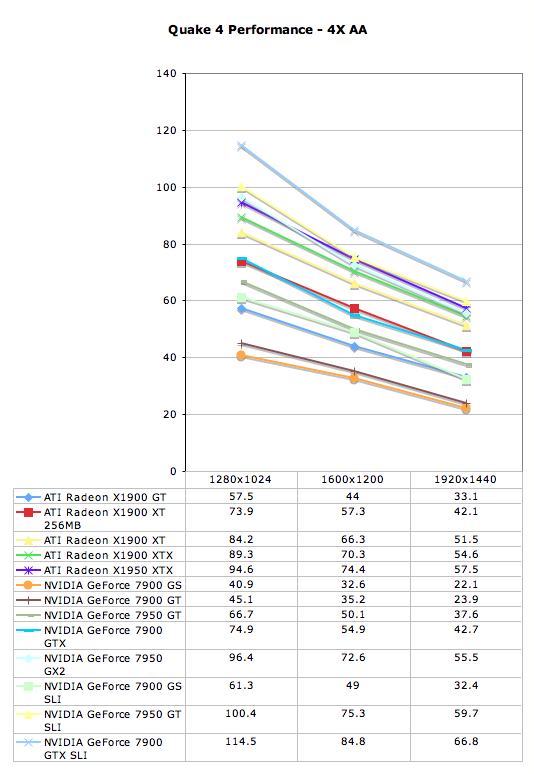Fall '06 NVIDIA GPU Refresh - Part II: GeForce 7950 GT and SLI
by Derek Wilson on September 14, 2006 9:00 AM EST- Posted in
- GPUs
Quake 4 Performance
There has always been a lot of debate in the community surrounding pure timedemo benchmarking. We have opted to stick with the timedemo test rather than the nettimedemo option for benchmarking Quake 4. To be clear, this means our test results focus mostly on the capability of each graphics card to render frames generated by Quake 4. The frame rates we see here don't directly translate into what one would experience during game play.
Additionally, Quake 4 limits frame rate to 60 fps during gameplay whether or not VSync is enabled. Performance characteristics of a timedemo do not reflect actual gameplay. So why do we do them? Because the questions we are trying to answer have only to do with the graphics subsystem. We want to know what graphics card is better at rendering Quake 4 frames. Any graphics card that does better at rendering Quake 4 frames will handle Quake 4 better than another card. While that doesn't mean the end user will necessarily see higher performance throughout the game, it does mean that the potential for seeing more performance is there. For instance, if the user upgrades CPUs while keeping the same graphics card, having higher potential GPU performance is going to be important.
What this means to the end user is that in-game performance will almost always be lower than timedemo performance. It also means that graphics cards that do slightly better than other graphics cards will not always show a tangible performance increase on an end user's system. As long as we keep these things in mind, we can make informed conclusions based on the data we collect.
Our benchmark consists of the first few minutes of the first level. This includes both inside and outdoor sections, with the initial few fire fights. We tested the game with Ultra Quality settings (uncompressed normal maps), and we enabled all the advanced graphics options except for VSync. Id does a pretty good job of keeping framerate very consistent, and so in-game framerates of 25 are acceptable. While we don't have the ability to make a direct mapping to what that means in the timedemo test, our experience indicates that a timedemo fps of about 35 translates into an enjoyable experience on our system. This will certainly vary on other systems, so take it with a grain of salt. The important thing to remember is that this is more of a test of relative performance of graphics cards when it comes to rendering Quake 4 frames -- it doesn't directly translate to Quake 4 experience.


At resolutions over 1280x1024, the GeForce 7950 GT falls short of the X1900 XT 256MB. Even with all these cards offering playable performance at 1920x1440, it's still a better idea to stick with the card that will give you higher performance for less money. In this case, that would be the Radeon X1900 XT 256MB. That is, if you can get ahold of it at a reasonable price.


While these numbers are a little more cluttered with lower end SLI solutions falling on top of high end single card setups, the lead ATI has held since their release of Catalyst 6.8 remains strong, especially with AA enabled. Not only does the X1900 XT 256MB outperform the 7950 GT, it outperforms the 7900 GTX. Not even SLI is enough to give an advantage to NVIDIA in these tests, and the 7950 GX2 only barely edges out the X1950 XTX in performance.
There has always been a lot of debate in the community surrounding pure timedemo benchmarking. We have opted to stick with the timedemo test rather than the nettimedemo option for benchmarking Quake 4. To be clear, this means our test results focus mostly on the capability of each graphics card to render frames generated by Quake 4. The frame rates we see here don't directly translate into what one would experience during game play.
Additionally, Quake 4 limits frame rate to 60 fps during gameplay whether or not VSync is enabled. Performance characteristics of a timedemo do not reflect actual gameplay. So why do we do them? Because the questions we are trying to answer have only to do with the graphics subsystem. We want to know what graphics card is better at rendering Quake 4 frames. Any graphics card that does better at rendering Quake 4 frames will handle Quake 4 better than another card. While that doesn't mean the end user will necessarily see higher performance throughout the game, it does mean that the potential for seeing more performance is there. For instance, if the user upgrades CPUs while keeping the same graphics card, having higher potential GPU performance is going to be important.
What this means to the end user is that in-game performance will almost always be lower than timedemo performance. It also means that graphics cards that do slightly better than other graphics cards will not always show a tangible performance increase on an end user's system. As long as we keep these things in mind, we can make informed conclusions based on the data we collect.
Our benchmark consists of the first few minutes of the first level. This includes both inside and outdoor sections, with the initial few fire fights. We tested the game with Ultra Quality settings (uncompressed normal maps), and we enabled all the advanced graphics options except for VSync. Id does a pretty good job of keeping framerate very consistent, and so in-game framerates of 25 are acceptable. While we don't have the ability to make a direct mapping to what that means in the timedemo test, our experience indicates that a timedemo fps of about 35 translates into an enjoyable experience on our system. This will certainly vary on other systems, so take it with a grain of salt. The important thing to remember is that this is more of a test of relative performance of graphics cards when it comes to rendering Quake 4 frames -- it doesn't directly translate to Quake 4 experience.


At resolutions over 1280x1024, the GeForce 7950 GT falls short of the X1900 XT 256MB. Even with all these cards offering playable performance at 1920x1440, it's still a better idea to stick with the card that will give you higher performance for less money. In this case, that would be the Radeon X1900 XT 256MB. That is, if you can get ahold of it at a reasonable price.


While these numbers are a little more cluttered with lower end SLI solutions falling on top of high end single card setups, the lead ATI has held since their release of Catalyst 6.8 remains strong, especially with AA enabled. Not only does the X1900 XT 256MB outperform the 7950 GT, it outperforms the 7900 GTX. Not even SLI is enough to give an advantage to NVIDIA in these tests, and the 7950 GX2 only barely edges out the X1950 XTX in performance.










31 Comments
View All Comments
pmcguire - Thursday, September 21, 2006 - link
Anyone tried the XFX card in a Zalman HD160 case?I have ordered one but now I am getting nervous that the heatsink is too high.
zemane - Saturday, September 16, 2006 - link
marine73 - Friday, September 15, 2006 - link
With some versions of the 7900GT costing $280, you'd have to be nuts not to spend the xtra $20 bucks to get the additional 256Mb of ram. The performance increase is obvious from the charts, and since most Nvidia cores do OC fairly well (my BFG is running 580/800) you could most likely get the 7950GT to peform like a 7900GTX, for about 150-200 bucks less. Now if only they can get them to be DirectX 10 compliant...Pastuch - Thursday, September 14, 2006 - link
In Canada you can buy an ATI/Saphire X1900xt 512mb for $299. A 7950GT goes for $350. These prices are pulled from this weeks flyer at NCIX.com, the Canadian Newegg.As always, Nvidia screws over Canadian customers.
yyrkoon - Monday, September 18, 2006 - link
Gee, lets see, I wonder if buying a graphics card that is currently based in my home country is cheaper than one that has to be imported . . .Wait until ATI moves to the US . . .
Pastuch - Thursday, September 14, 2006 - link
THe lowest price I can find in Canada on a 7900GT is $290.ROFL at Nvidia.
P.S. I actually would rather buy Nvidia but the prices up here are so out of whack I can't justify it.
coldpower27 - Friday, September 15, 2006 - link
Yeh, Nvidia currently is expensive in Canada, until prices normalize the X1900 XT 512 is a pretty good deal, as long as it remains in supply.xsilver - Thursday, September 14, 2006 - link
funny,down here in australia - its the other way around
nvidia is cheaper
7900gt = 374au ($280US approx
x1900xt = 410AU (308US approx)
ati is still the better buy because its faster.
it actually gets worse in the lower price bracket of x1900gt as they are quite hard to find and really expensive
xsilver - Thursday, September 14, 2006 - link
oh wait - just looked againthat x1900xt is the 256mb model
if u want the 512mb model
= 525au (395US)
7950gt 512mb = $430au = 325us
big difference!
splines - Friday, September 15, 2006 - link
Same with all electronics, pretty much. Everything from mobile phones up to the AUD$1000 PS3 - and Americans complain about $600?The really odd thing is we have the second highest standard of living in the world, yet our currency is also one of the most undervalued amongst western industrialised nations. Granted, our market is small, but 20-odd million people still have a lot of purchasing power.
*sighs* Maybe one day they'll take us seriously.